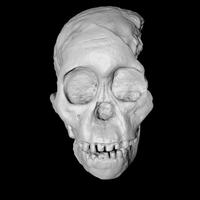
May 15, 2014
Today, the story of one little thing that has radically changed what we know about humanity’s humble beginnings and the kinds of creatures that were out to get us way back when.
Wits University Professor Lee Berger and Dr. Chris Stringer from London’s Natural History Museum explain how a child’s skull, found in an ancient cave, eventually helped answer one of our oldest questions: Where do we come from? Then Lee takes us on a journey to answer a somewhat smaller question: how did that child die? Along the way, we visit Dr. Bernhard Zipfel at Wits University in Johannesburg to actually hold the skull itself.
We wanted to give you a chance to hold the skull, too. So we did a little experiment: we made a 3D scan of it. If you visit our page on Thingiverse, you’ll see the results. Anyone with access to a 3D printer can print their own copy of the skull. (We printed a bunch, with help from our friends at MakerBot—there’s even a purple one with sparkles.)
We also collaborated with the folks at Mmuseumm, a tiny (really tiny, it’s in an elevator shaft) museum in Manhattan. You can visit them to see the 3D printed skull, along with the other wonderful things in their collection: mosquitoes swatted mid-bite, toothpaste tubes from around the world, and much more.
Thanks to JP Brown, Emily Graslie and Robert Martin at the Field Museum in Chicago for scanning the skull. Thanks to Curtis Schmitt and shootdigital for refining the scan. Thanks to Bre Pettis and Jenifer Howard at MakerBot for guiding us through the world of 3D printing.